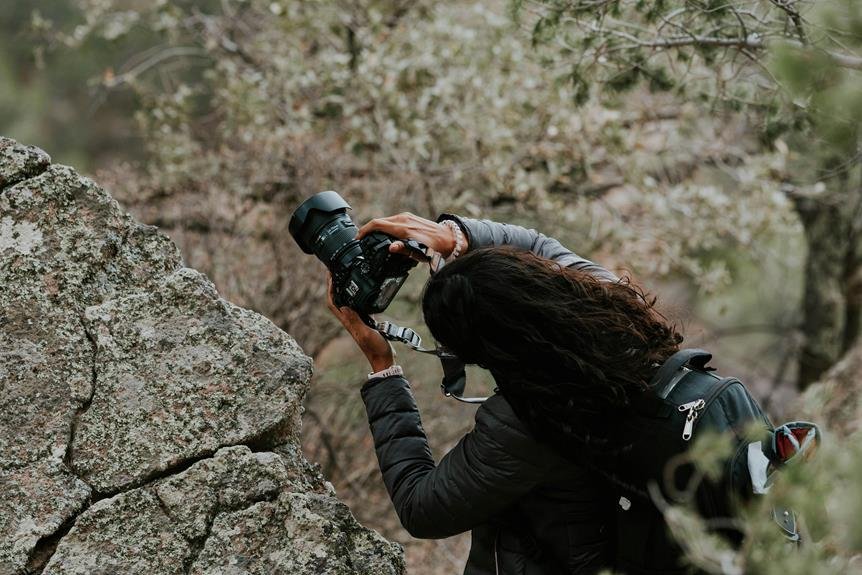5 Camera Issues? Troubleshooting Guide
If you're experiencing camera troubles, here's a quick guide to help you out. To begin with, make sure your lens is clean for sharp photos. Troubleshoot flash issues by checking connections and settings. For focus problems, keep your lens clean and consider manual adjustments. Manage exposure well by understanding settings like white balance. Lastly, resolve connectivity problems by confirming cables and network settings. Mastering these steps will refine your photography skills and enhance your overall camera experience.
A Quick Overview
- Clean the lens for sharper images.
- Verify flash settings and connections.
- Ensure proper focus adjustments.
- Manage exposure and white balance.
- Check cable connections and network for connectivity.
Blurry Photos
If your camera is consistently producing blurry photos, make sure that the lens is clean and free from smudges or dirt.
Additionally, check your camera settings to confirm they're optimized for the lighting conditions. Adjusting the aperture, shutter speed, and ISO can greatly impact the clarity of your photos.
Properly configuring these settings according to the lighting conditions will help reduce blurriness and improve overall image quality.
Flash Not Working
Verify that the flash on your camera is properly connected and functioning before attempting to troubleshoot any issues with it. Flash not working may result from faulty hardware or software glitches.
Begin by checking the flash settings in your camera menu. Try adjusting the flash settings or resetting the camera to default settings.
If the issue persists, consider seeking professional repair to fix any internal problems causing the flash malfunction.
Focus Problems
To address focus problems on your camera, make sure that the lens is clean and free from any obstructions that may affect the autofocus functionality. Regular lens cleaning is crucial for peak performance.
If the autofocus still struggles, consider manual adjustment options available on your camera. By manually fine-tuning the focus, you can overcome minor issues and guarantee your shots are sharp and clear.
Exposure Issues
For best results in your photography, make sure that exposure issues are thoroughly understood and appropriately managed through adjustments in your camera settings.
Pay attention to white balance to guarantee accurate color representation.
Experiment with aperture settings to control the amount of light entering your camera and achieve the desired depth of field.
Understanding and mastering these aspects will greatly enhance the quality of your photos.
Connectivity Troubles
If you're experiencing connectivity troubles with your camera, the first step is to check the physical connection of your cables and make sure they're securely plugged in.
For Wi-Fi problems, try moving closer to the router and confirm the correct network credentials are entered.
When dealing with Bluetooth connectivity issues, make sure the camera and the device you're connecting to are within the appropriate range and not experiencing interference.
Frequently Asked Questions
How to Clean a Camera Lens Properly?
To clean a camera lens properly, use proper techniques like using a lens blower to remove dust, a microfiber cloth for smudges, and lens cleaning solution for stubborn marks. Regular lens maintenance guarantees clear photos.
Why Are My Photos Turning Out Too Dark?
To improve your dark photos, try adjusting lighting settings and exposure on your camera. Check your camera settings for any anomalies. If needed, employ editing techniques to brighten images. Proper adjustments can enhance photo quality.
What Memory Card Is Best for My Camera?
For your camera, the best memory card is one with high speeds like UHS-II for quick data transfer. Consider capacity based on your needs, like 64GB or 128GB. Formats like SDXC are common. Choose wisely!
How to Prevent Lens Fogging in Humid Conditions?
To prevent lens fogging in humid conditions, use anti-fog solutions or silica gel packs for humidity control. Keep your camera in a sealed bag with these items to avoid lens condensation. Follow these prevention tips for clear photos.
Why Is My Camera Battery Draining Quickly?
To prevent quick camera battery drain, maintain proper battery care by avoiding overcharging. Optimize power saving settings and monitor your charging habits. Limit unnecessary camera usage and turn off features when not in use to conserve battery life effectively.







